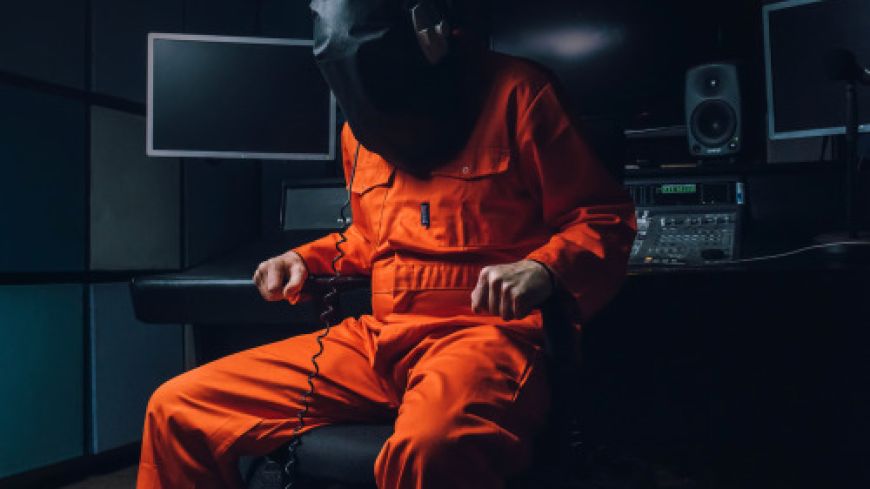
Inspired by the research of musicologist and human rights campaigner Dr. Morag J. Grant, Louise Quinn has created a masterful fever dream of music, theatre, and activism in Music Is Torture, a co-production between Tromolo Productions and the Tron Theatre.
At first take, it seems as though the metaphor of “music as torture” amounts to Jake, a middle-aged sound engineer played by Andy Clark, living in his own personal “Limbo” that is his failing recording studio. Recording dreamy artpop behind the glass for 15 years is a band called Dawnings (the real life band A Band Called Quinn with Louise Quinn on vocals and guitar). Nick, a stoner nuisance of a 'friend' played by Harry Ward, pops in with every turn of the season, taunting Jake to 'sell-out' by creating baseless EDM tracks for easy money. As soon as you’ve decided that Dawnings is maybe his consciousness or a group of angels and that Nick is the personification of Jake’s self-doubt or the devil, the line between reality and fantasy blurs. Quinn’s writing takes you down the stairs in the dark and you miss a step along the way, the subsequent realisation unsettling and disorienting as you sink into the larger theme at play of music as a means of literal torture. Jake’s caved into the pressure to 'sell-out'. His trash dance hit entitled Kill Them All is primarily being used by the US government to torture terrorist suspects, making him a sort of war criminal in the eyes of the social media mob as the royalties roll in.
You’d think that tackling two separate messages of torture as it relates to the music industry would be too big a bite for one show to swallow, but Louise Quinn, the production team and the cast just nail it with this at once both beautiful and nauseating labyrinth of theatrical multimedia collaboration.
Emily James’ perfectly realised back room recording studio boasts small details that give Jake’s world real dimensions, a Dalek statue sits next to the sound board, an Irn Bru bottle sits half empty, an “I Gotta Have More Cowbell” poster hangs on the wall. This dedication to nuance is seen in every thread of the show from the actors' character choices, such as Nick exiting in military style, to the music, particularly in Dawnings' lyrics and in the trumpet player’s sound-checking with tone-setting musical phrases. One line of We’re in the Money plays and you see Jake showing off his new laptop and trainers after receiving his Kill Them All cash.
The marriage of video, light, and sound design by Tim Reid, Kate Bonney, and Bal Cooke is truly where this piece goes to the next level. Witnessing incredibly innovative and ambitious Music Is Torture makes me want to blindly attend any future Tromolo Productions piece, and that feeling about a company doesn’t come around very often.
Watching Ben Harrison-directed Music Is Torture as a musician is like listening to an album that is eerily relatable. Watching Music Is Torture and its arresting Guantanamo Bay images, especially as an American, is jarring, horrifying, productive, important. Outside of the injustice that groups like freedomfromtorture.org fight against, funding for the arts is disappearing in the face of an ever-increasing military budget, and the pressure to “sell-out” on a global scale threatens many corners of our society. Jake’s devastating ending signifies that now, more than ever, empathy is paramount. As Dawnings cries out in one of their ASMR-inducing tunes, “I want this world to show me something better beyond doubt and fear.” #WeAreAllJake
25 -27 May

